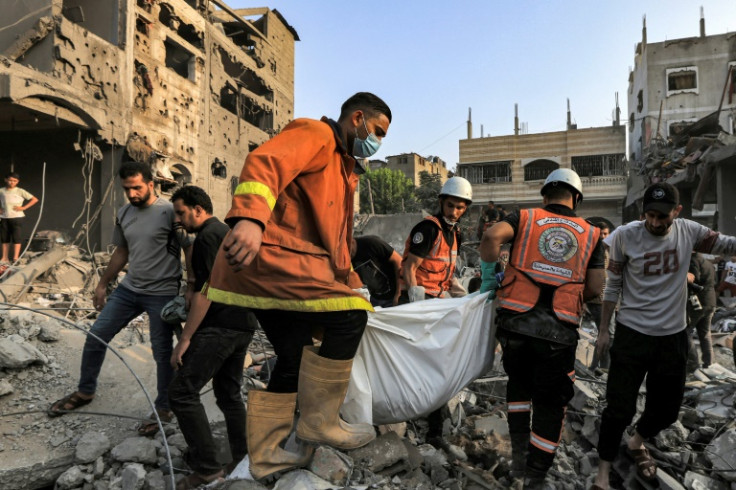IDF Say Hamas Has Fuel As UN Call For Ceasefire
In response to the UNRWA warning that fuel is running out in Gaza, the UN has called for a ceasefire and the IDF has accused Hamas of holding on to 500,000 litres of fuel.

This week, a UN Security Council resolution, drafted by Russia, failed to win the nine-vote minimum.
The resolution called for a ceasefire in Gaza and was welcomed by Russia, China and the United Arab Emirates (UAE). Both the US and the UK voted against the draft, while nine other members abstained.
Antonio Guterres, the Secretary General of the UN, called the bombardment of retaliatory strikes on the Gaza Strip, a "collective punishment of Palestinian people".
Guterres noted that while people remain trapped in the Strip, the behaviour of the IDF has violated humanitarian international law and demanded a ceasefire.
"To ease epic suffering, make the delivery of aid easier and safer and facilitate the release of hostages. I reiterate my appeal for an immediate humanitarian ceasefire," he said.
Guterres argued that the Hamas massacre of Israelis on October 7 was "appalling" but the Palestinian people "have seen their land steadily devoured by settlements and plagued by violence; their economy stifled; their people displaced and their homes demolished. Their hopes for a political solution to their plight have been vanishing".
The demand for a humanitarian ceasefire comes after the UNWRA, which has operated in Gaza since 1950, warned: "If fuel does not enter, UNWRA will be forced to significantly reduce and in some cases bring humanitarian operations to a halt."
In response to the UNWRA warning, the IDF rejected fuel demands and posted images on X, that accused Hamas of having enough fuel to produce electricity and to keep hospitals operating.
The IDF said that the photos show that Hamas is holding half a million litres of fuel, writing on X: "These fuel tanks are inside Gaza. They contain more than 500,000 litres of fuel. Ask Hamas if you can have some."
These fuel tanks are inside Gaza.
— Israel Defense Forces (@IDF) October 24, 2023
They contain more than 500,000 liters of fuel.
Ask Hamas if you can have some. https://t.co/Dlag6VdbMq pic.twitter.com/WXzZMFr8yI
Later, the IDF returned with a statement on X that said: "Civilians and hospitals in Gaza need fuel to produce electricity. Hamas has that fuel."
The images, which, according to the IDF, displayed large oil tankers in the south of the Gaza Strip, were first shared by the IDF's Arabic-language account on X.
The IDF's Arabic-language account also accused Hamas of terrorism and theft in its caption that read: "Hamas-ISIS steals this fuel from civilians and transfers it to its tunnels, rocket launchers, and leaders. This is what Hamas's list of priorities looks like."
"This is what over half a million litres of diesel looks like," wrote IDF Arabic spokesman Avichay Adraee, "while Hamas keeps claiming it does not have enough fuel to support hospitals and bakeries."
The accusation also comes after Hamas called the power outage at the Indonesian Hospital in the northern region of the Strip a "crime against humanity".
Hamas later urged the UN and Arab and Muslim countries in the Middle East, to step up their efforts in addressing the Gaza crisis.
After Guterres called for a ceasefire, Israel's envoy to the UN, Gilad Erden, called for the general secretary to resign.
"His comments... constitute a justification for terrorism and murder. It's sad that a person with such views is the head of an organisation that arose after the Holocaust," Erden said.
According to the Hamas-run health ministry, IDF airstrikes have killed at least 704 people in Gaza in the last 24 hours, bringing Gaza's death toll to 5,791.
The toll is a result of 18 days of bombing in the enclave and includes 2,360 children.
Although the US rejected the Russian-drafted UN Security Council resolution, US President Joe Biden recognised how Gaza is turning into a death trap and said that aid travelling into Gaza was "not fast enough".
At a press conference, Palestinian Health Minister Mai al-Kaila has since called for a safe ferry passage for injured and critically ill people to hospitals in Egypt.
The UN has reported that at least 100 trucks need to be entering the Strip each day to provide Palestinians with their basic needs. Since the Rafah crossing was opened, the enclave has been receiving 15 to 20 trucks each day.
© Copyright IBTimes 2025. All rights reserved.






















